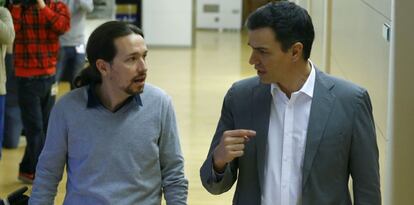Socialist leader to ask party chiefs for support in attracting Podemos
Sánchez wants to make last attempt to get leftist group to sign up to pact with Ciudadanos

The political forces of change must unite to comply with the mandate set out by Spanish voters at the polls on December 20. That’s the interpretation that Socialist Party (PSOE) leader Pedro Sánchez will pitch to the federal committee of his party today, as the politician seeks support to reach a deal with left-wing anti-austerity party Podemos as part of his ongoing efforts to form a government after the December general election left no clear winner.
While the incumbent Popular Party (PP) won the most votes at the polls, it fell short of a majority, and its leader, acting Prime Minister Mariano Rajoy, has failed to find support among other parties needed for the upcoming investiture vote in Congress. As such, King Felipe invited Sánchez to try to form a government, the result being an agreement reached last week between the PSOE and emerging center-right group Ciudadanos aimed at creating a minority government.
The pact was given the green light by 80% of party members in a weekend vote in which 51.7% of eligible members took part
However, to be successful at the investiture vote, Sánchez will need the support or abstention of Podemos.
According to party sources, Sánchez is seeking “a transverse and inclusive agreement” between “different political forces,” one that was given the green light by 80% of party members in a vote on Friday and Saturday in which 51.7% of eligible members took part.
The pact reached between Sánchez and Ciudadanos leader Albert Rivera last week had raised hackles in the PSOE because of measures aimed at streamlining local and regional administrations by doing away with provincial authorities proving unpopular with some sectors of the party. They were received particularly badly by regional leaders of traditional Socialist power bases such as Andalusia, Aragón, Galicia, and Extremadura, where links are strong between provincial representation and the PSOE’s power apparatus.
Meanwhile, the PP has formally declined to support the bid by Sánchez to become prime minister. “You will understand that, as the Popular Party won the most votes in Spain, it would be difficult for me to explain to my party’s voters [...] that I am supporting somebody who did not win and intends to overthrow everything my government has done and replace it with the PSOE’s program,” Mariano Rajoy wrote in a letter to Rivera last week.
For its part, Podemos, the third political force to emerge from the December polls, has called the PSOE-Ciudadanos pact “ineffective” and said it went against the party’s own platform on the economy and the push for a referendum on Catalan independence.
The program drafted between Sánchez and Rivera covers labor market reform, taxes, regional administration, abortion rights, religious education in schools and energy policy.
English version by Simon Hunter.
Tu suscripción se está usando en otro dispositivo
¿Quieres añadir otro usuario a tu suscripción?
Si continúas leyendo en este dispositivo, no se podrá leer en el otro.
FlechaTu suscripción se está usando en otro dispositivo y solo puedes acceder a EL PAÍS desde un dispositivo a la vez.
Si quieres compartir tu cuenta, cambia tu suscripción a la modalidad Premium, así podrás añadir otro usuario. Cada uno accederá con su propia cuenta de email, lo que os permitirá personalizar vuestra experiencia en EL PAÍS.
¿Tienes una suscripción de empresa? Accede aquí para contratar más cuentas.
En el caso de no saber quién está usando tu cuenta, te recomendamos cambiar tu contraseña aquí.
Si decides continuar compartiendo tu cuenta, este mensaje se mostrará en tu dispositivo y en el de la otra persona que está usando tu cuenta de forma indefinida, afectando a tu experiencia de lectura. Puedes consultar aquí los términos y condiciones de la suscripción digital.









































